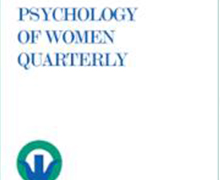본문
Young women's sex talk online: Roles of anonymity, social closeness, and cultural background on perceived appropriateness and behavioral intention.

By Prof. Hye Eun Lee
Department of Communication & Media
PURE Research Profile
hyeeunlee77@ewha.ac.kr
Professor Hye Eun Lee's recent work titled "Young Women's Sex Talk Online: Roles of Anonymity, Social Closeness, and Cultural Background on Perceived Appropriateness and Behavioral Intention" was published in Psychology of Women Quarterly (2020 Journal Impact Factor = 4.062, JIF Rank = 2/44 in Women's Studies). In the article, professor Hye Eun Lee with her two colleagues, examined the roles of anonymity and social closeness in predicting young women's perceptions of sex talk and intentions to post such content in cyberspace. Further, they investigated cultural differences among Asian, Latina, and European Americans.
Although sex remains one of the most controversial and least discussed topics among women, cyberspace may be one of the few popular places that allow women to engage in "sex talk" (i.e., communication about sexual interests, enjoyment, and experiences). The study attempted to examine three potential predictors of women's perception and behaviors of sex talk online: level of anonymity, type of cultural background, and degree of social closeness.
A total of 466 undergraduate women from the three cultural groups participated in the online experiment. Participants were randomly assigned to either a low anonymity condition (i.e., Facebook) or a high anonymity condition (i.e., an anonymous online forum) where they were exposed to identical sex talk stimuli.
The main findings showed that the level of anonymity influenced the perceived level of appropriateness of the sex talk even though the content of the information in the sex talk posts was identical across the conditions. Young women's perceived appropriateness of another female user's sex talk was higher in the high anonymity condition than in the low anonymity condition. In addition, young women reported lower intentions to post sex talk in the low anonymity condition than in the high anonymity condition. Also, the perceived appropriateness of sex talk varied due to social closeness between the viewer and the discloser. The closer viewers were to the discloser, the more appropriate they perceived the sex talk post to be. Finally, Unexpectedly, compared to European Americans, Asian and Latina American women reported perceiving other women's sex talk posts as more appropriate and having greater intentions to post sex talk.
The findings of this study can be harnessed in educational settings and awareness campaigns for girls and women. Although cyberspace could be viewed as a safe place for discussing sex-related matters, we found that sex talk posts were judged as inappropriate, especially when they were posted on Facebook or when posted by socially distant others. The need for caution when posting sex talk should be discussed because posts are visible to socially distant viewers who may evaluate them negatively. Such discussion should aim not to discourage young women from expressing sexual interests and desires online but rather to help them acquire skills to strategically manage their impressions, which may help enhance their sense of control. Finally, the results of the study call for further support for young women by acknowledging and validating their open talk about sexual interests and enjoyment. This study is among the first to experimentally examine how young women's perceptions of and behavioral intentions toward online sex talk are influenced by various factors such as level of anonymity, cultural background, and degree of closeness.
* Related Article
Emiko Taniguchi, Hye Eun Lee, Xiaowen Guan, Young women's sex talk online: Roles of anonymity, social closeness, and cultural background on perceived appropriateness and behavioral intention, SAGE Journals, Volume: 45 issue: 1, page(s): 126-139
